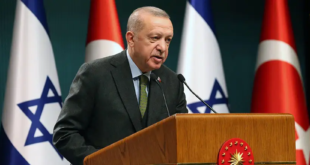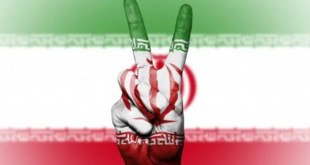TEHRAN (Reuters) — Iran’s supreme leader Ayatollah Ali Khamenei said on Monday Iran would press ahead with its pursuit of nuclear energy, indicating it will not heed a UN demand it stop enriching uranium or face possible sanctions.
Khamenei, who has the final word, did not mention enrichment by name but senior officials have repeated in recent days that it would not be stopped. The deputy head of Iran’s Atomic Energy Organisation joined the chorus on Monday.
“Considering the technical advancement of Iranian scientists, the suspension of uranium enrichment is not possible any more,” Mohammad Saeedi told Iran’s Fars News Agency.
Saeedi said Iran would formally reply on Tuesday to a nuclear package offered by six world powers, in return for an end to enrichment, that is aimed at allaying the West’s fears that Iran wants atomic bombs.
Khamenei said Iran would pursue its nuclear plans.
“The Islamic Republic of Iran has made its decision and, in the issue of nuclear energy, will continue its path powerfully … and it will receive the sweet fruits of its efforts,” state television quoted him as saying.
The United States, Russia, China, Britain, France and Germany presented the package in June, offering Iran economic and other incentives if it first halted uranium enrichment, a process that has both military and civilian uses.
The UN Security Council has demanded Iran halt enrichment by August 31 or face possible sanctions.
“It’s up to the international community, including the United States, to work in concert for effective diplomacy, and that begins at the United Nations Security Council,” President George W. Bush said in Washington on the Iran nuclear dispute.
Iran has suggested it will not give a simple “Yes” or “No” to the package but said the reply would be “multi-dimensional”.
Iranian officials say they want more talks, but Western diplomats say Iran must halt enrichment first.
Anything short of that is likely to be viewed as a rejection of the offer in Western capitals. Western diplomats say the deadline for Iran to act is August 31.
A senior Iranian official said Iran would respond in writing, possibly handing it to the British, French and German ambassadors in Tehran but more likely delivering it to the European Union’s Javier Solana in Brussels.
Solana, the EU foreign policy chief who handed Iran the package in June, said in a statement he had spoken by phone with Iran’s chief nuclear negotiator, Ali Larijani, on Sunday. He said both sides were open to further contacts “under the right circumstances”.
Solana’s office did not react to Khamenei’s statement but said Solana expected Larijani to reply. “The Larijani-Solana channel is the one that counts,” an EU diplomat said.
Â
Swift action
Â
The world’s fourth largest oil exporter insists it has the right to enrich uranium under international treaty and says it will use the technology to produce electricity.
Western diplomats say Iran must first prove its aims are entirely peaceful to enjoy that right but the UN nuclear watchdog, the International Atomic Energy (IAEA), says questions must be answered before it can give Iran a clean bill of health.
Washington has said it expects the United Nations to act swiftly if Iran refuses to stop the sensitive atomic work. But last month’s resolution does not include an automatic trigger for sanctions, so any such move could take weeks or more.
Iran may calculate that UN divisions mean it faces only modest measures such as asset freezes or travel restrictions on officials, which it feels it can tolerate, analysts say.
Western leaders regard Iran as an urgent risk to peace, while Russia and China, key trade partners of Tehran, do not.
Some Iranian analysts say Iran may feel strengthened after Lebanon’s Iranian-backed Hizbollah scored what the group and Tehran called a victory in its conflict with Israel.
Although the United States has called for a diplomatic solution, it has refused to rule out military action.
Uranium enrichment at heart of dispute
TEHRAN (AFP) — Enrichment, the sensitive process that Iran vowed on Monday was “no longer possible” to stop, takes low-grade uranium and refines it into a material that can power reactors — or an atomic bomb.
The key difference is that reactor fuel needs uranium that has been enriched only to a low level, whereas an atom bomb requires a much more highly enriched version.
When uranium ore is dug out of the ground, more than 99 per cent of it is made up of the more stable U-238 isotope, and just 0.7 per cent of it consists of the U-235 isotope that is useful to nuclear engineers.
The goal, therefore, is to beef up the percentage of U-235 so that there is enough of it to induce a chain reaction.
The first step is to mill the ore into a concentrate called yellowcake. This is converted into uranium hexafluoride gas (UF6) ahead of enrichment. One of the two methods of enrichment is that chosen by Iran, which is by gas centrifuge.
The UF6 is piped in a cylinder which is then spun at high speed.
The rotation causes a centrifugal force that leaves the heavier U-238 isotopes at the outside of the cylinder, while the lighter U-235 isotopes are left at the centre.
The process is repeated many times over through a cascade of centrifuges to create uranium of the desired level of enrichment.
When the U-235 level reaches around five per cent, the uranium is enriched enough to be used as fuel for civil nuclear reactors.
Iran says it has not enriched uranium beyond 4.8 per cent and only on a limited scale.
To be used as the fissile core of a nuclear weapon, the uranium has to be enriched to more than 90 per cent and be produced in large quantities.
Little Boy, the Hiroshima bomb, used 64.1 kilos of enriched uranium, although a device can also be built from between 15 and 25 kilos of material, according to experts. A bomb can also be made from as little as six kilos of plutonium, a by-product of nuclear reactors.
Iran said Monday it was planning to start up a plant in the city of Arak to produce heavy water for use in a different sort of nuclear reactor.
The UN nuclear watchdog is concerned about the risk of diversion of nuclear materials as the reaserch reactor could produce 8-10 kilogrammes of plutonium a year, enough to make at least two nuclear bombs.
Enrichment using the centrifuge method is half a century old.
But it requires thousands of centrifuges connected in cascades to produce weapons-grade uranium.
The machines and their components are highly specialised.
When a country starts to buy large numbers of them on the black market — as Iran was reported to have done several years ago — it raises suspicions that it is trying to develop a nuclear weapon.
Iran has installed 164 centrifuges at a pilot plant in Natanz, and a senior official has said Tehran wants to install 3,000 centrifuges within the next year.
Iran is also trying to develop advanced P2 centrifuges — devices that are capable of making weapons-grade uranium more efficiently than the P1 technology currently in use.
In 2004, Iran told the UN nuclear watchdog it planned to convert 37 tonnes of yellowcake into UF6 for a civil enrichment programme.
That, experts said, was enough to make one or more atomic bombs.
The country now says it has 110 tonnes of UF6.
Enrichment is only one of several hurdles to overcome before a country is considered nuclear-weapons capable.
One is the electronic trigger, whose split-second timing is essential for unleashing the chain reaction necessary for a military device.
Another is weaponisation — putting the device into a missile or bomb that can be delivered to a target. Iran is a major exporter of oil and has vast reserves of natural gas. It contends it needs nuclear energy to provide power for its citizens when its fossil fuel reserves run out, and to free up its reserves for export.
 Eurasia Press & News
Eurasia Press & News



